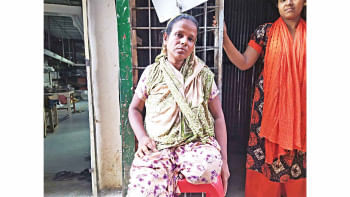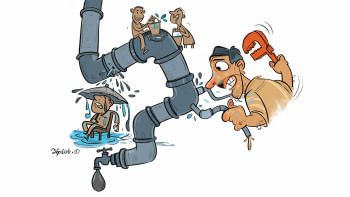Is it still an accident if death is caused by systemic negligence?

That residents of any modern capital city could be exposed to accidents related to septic tanks or uncleaned sewerage lines is quite unthinkable. Yet, this is what the residents of Dhaka are being exposed to everyday. On November 11, a 40-year-old woman, who worked as a cleaner at a car showroom, lost one of her legs when, while returning from work, three slabs of a manhole suddenly blew up around 15 to 16 feet high and fell on her. Needless to say, her life, since then, has been an overwhelming struggle.
In the last several years, a number of such events have hogged the headlines. For example, on March 27, 2018, a septic tank blast in the capital's Pallabi area led to the death of a three-year-old while also leaving four others critically injured. On November 30, 2015, at least five members of a family sustained burn injuries in a septic tank blast in Dakkhinkhan's Faridabad area.
According to experts, residents of Dhaka are being exposed to such risks because many of the city's sewerage lines are not maintained properly, and some were not even constructed following proper designs. Adding to its long list of failures, the Dhaka Water Supply and Sewerage Authority (Wasa) has also failed to bring the whole city under one sewerage network. Thus, residents in many areas were either forced to set up septic tanks or connect their sewage lines with storm water drains.
As of last year, 71 percent of household latrines in the city were directly or indirectly open to drains, eventually discharging wastes into the city's lakes and canals. Meanwhile, Dhaka's septic tank soak pits have also not been working properly because of their low capacity for soil infiltration. The culmination of all these and other factors has led to a situation where people are constantly exposed to such freak accidents. However, can such incidents really be called "accidents" when it is the apathy of the authorities that causes them? According to a report by this newspaper, Wasa prepared a 15-year sewerage master plan in 2015 to bring 100 percent of its areas under the sewerage network. However, only one among the proposed five sewerage treatment plants is now near completion.
How long will people have to wait for Wasa to get such a basic service done right? How many more people will have to lose their limbs or lives before Wasa officials are held accountable for failing to properly maintain sewerage lines? It is embarrassing to hear our government officials constantly boast about our development achievements when our sewerage system – the most basic element of any liveable city – is in such shambles.
We call on the government to urgently hold relevant officials accountable for these failures. It is unacceptable for anyone to be at constant risk of injury or death simply because of the negligence of Wasa.

 For all latest news, follow The Daily Star's Google News channel.
For all latest news, follow The Daily Star's Google News channel. 









Comments